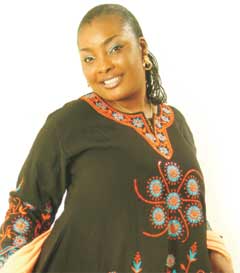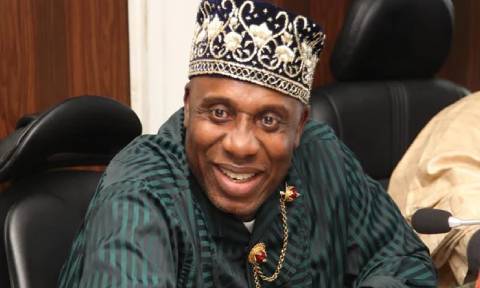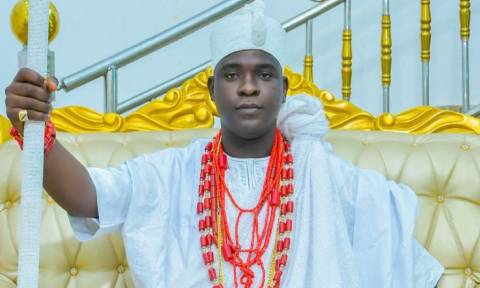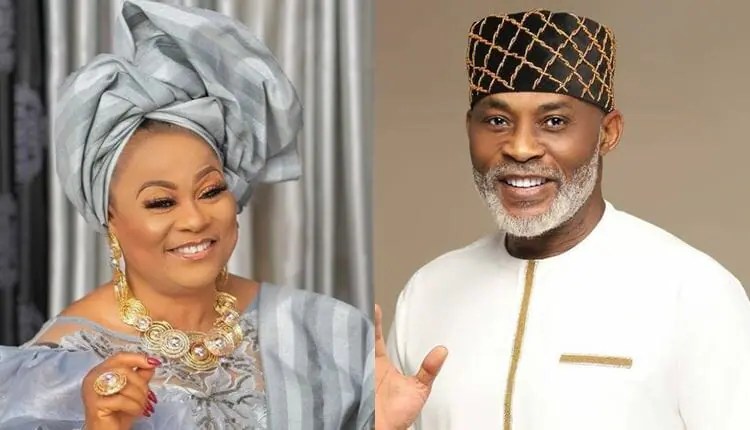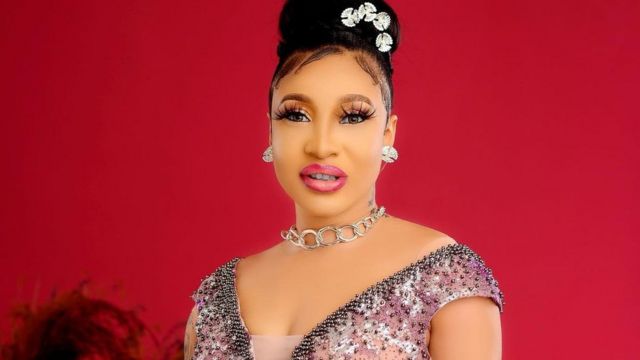
In the popular TV series, Domino, he acted Oscar, an arrogant, hostile and insensitive husband. In this interview with ADEOLA BALOGUN, Femi Branch speaks about how much of Oscar he has in him and relives an encounter he had with Abiola Atanda aka Madam Kofo at a location.
How did your romance with acting begin?
It started as far back as 1993. We came to Lagos, while we were still students at the Obafemi Awolowo University, Ile-Ife, to shoot a movie with a team of expatriates from the United States. It was called Omen of Love. Although I played a very small role in the film, it was a very good starting point for me, because it was a professionally packaged job. Unfortunately, the film was not released in Nigeria. After that, the next thing was the MTN commercial. All the while, I had been doing stage productions, because I am a stage-trained artiste. Expatriates also shot the commercial. The first experiences that I had with the camera were very professional jobs, which I am very grateful for.
How was it like crossing over from the stage to home video?
For me, it was not a difficult thing to do, because of the kind of training I had was not just stage (training) but total theatre. My godfather then, the late Prof. Ola Rotimi, believed in creating well rounded artistes. Then, he would tell us the need to know everything about everything. That made it easy for me to blend. The only challenge I think a stage-trained artiste would have crossing over to film is that he knows that the stage is larger than life. Everything is played out–the voice level, costumes, etc. But in film, it is a different ball game; what with all the electronics aids to enhance performance.
Do you think you can still go back to stage?
It is not a matter of going back, I have been doing stage as well. I never left the stage. I have done major productions like Private Life, with Genevieve and other artistes, and some other productions.
Was Theatre Arts the course you were admitted for?
Funnily enough, I didn’t go to school for that. I entered Ife to study Religious Studies, because it was the year that I wrote JAMB that the English Language paper was cancelled, which really affected my score. So, I was given a provisional admission to study Religious Studies, because I was actually supposed to study Law. The arrangement was that I would cross over to Law in the second year. Fortunately, I discovered theatre and I knew that for me, there was no going back. It was something that caused a great deal of problem between me and my dad for some years, until he finally accepted. I think it was after the MTN commercial came out that he finally accepted and said maybe there was a future in it. Of course, he was just being genuinely concerned as a father, because then, the impression people had of artistes was that they were layabouts, never-do-wells. Happily, after the commercial, the kind of hype we got, he started to see things positively.
How did you escape studying religious studies?
The African Studies department, which houses the drama department, is situated between the academic and the residential areas. So, when we were coming from lectures, we used to pass a place called Old Buka, it is close to the drama department. So, anytime we passed through the place, we were always hearing people singing, drumming and shouting, and I would wonder, ‘Are these people also in this school to get a degree like me, with all this madness they are doing?’ I got very curious and said I needed to find out what they were doing. After lectures, we would go there to see them and at times joined them. And I really got intrigued, because prior to that, I never really did anything that had to do with drama. The only acting I did was when I was in secondary school, and that was even a small thing. When I discovered this, I was really intrigued that this was actually a professional course. After relating with some of the arts students, I realised that their workload was heavy and they were probably doing more work than some people in other departments. So, that was how I started attending rehearsals with them. And I tell you something, I begged, real hard, for my first production. Then, Chuck Mike, a director, brought a production to Ife. It was a tour of some universities; a kind of workshop. So, I decided to take part, even if it was a small part. They told me they already had their full cast but I begged them to create a character. The title of the play was Everyman. What got me into the play was very funny. When I wanted to go in to meet the director, the way I prostrated was crazy. Everyone was thrilled and felt that this guy was crazy. I just did that out of excitement, and that was how I got a chance to be part of it and many others afterwards.
That means you were not satisfied with the course you were pursuing then, and as such, you were desperate to escape and you stumbled on drama?
I never wanted to read religious studies. I was only there so that I would have the chance to cross over to Law. But I discovered something else that I loved; a course that I could study, enjoy myself and build a future and a career in. Because what holds most of us in this industry is the passion we have for the job. For most of us, it is not as financially rewarding as we would want it to be. Forget about the hype. Even for people who do mostly English films and get the so-called good money, it is not as good as it should be. It is because we love what we are doing, that is what keeps us going. I think that is what is most important anyway.
You eventually made a big break. Which movie did that for you?
It wasn’t a movie, it was the MTN commercial that did that for me. Because it was on national television, newspapers, everywhere. Luckily for me, it was a concept that everybody seemed to like. It gave us an advantage to build on. Even though many people didn’t know Femi Branch then, when you say the guy that did the MTN commercial, it clicked. It was from the MTN commercial that I got the job that I would say launched me into something bigger, which was Domino. Because it was at the launch of the MTN commercial then that the producer of Domino came to me and told me that there was something he would like me to do for him. I think Domino really did it and I was fortunate to get the character everybody loved to hate.
So after school, did you do any paid job?
No, that is one thing I never saw myself doing. I had always known that I would never be a salaried person in any establishment. Not because I have any problem with authority or with working with people, but I just knew that I would not do it. We were very fortunate when we were in school, we had an entrepreneurial disposition then. Two of my friends and I. Because right from when we were in school, we came together and formed a company. We were producing plays and taking them to places as far as Warri. We were getting contracts of as much as N300,000 way back then. That reinforced my resolve not to work for anybody. Although out of the three of us, I would say I am the only one that is actively involved in acting. One of us, Solomon Oguname, did the MTN commercial, Mama, na boy. He is in entertainment also. He has a programme on TV, Man and Woman, and he is also doing very well. The other person is into music production. He has a music label. He is Duker Kachi. That was the kind of dream we had.
You must have a very bad temper to be able to act Oscar the way you did in Domino.
It is a job. I will take it as a compliment if you say I was able to play the role because I have a bad temper. As far as I know, I am not hot tempered. Everybody has their temperaments and limits. But I definitely do not have such a temperament. It took a lot to be able to build that character, because it was something that was totally different from my personality. But I loved the character and I think at a point, I empathised with the character. I saw that he was really misunderstood as most people did not really understand where this guy was coming from. The truth of the matter is that there is an Oscar in every one of us. I must tell you that I spent some time to be able to interpret the character. It was a role I gave my heart to.
While people were still talking about Oscar, you acted a similar character in Senseless. Can you honestly lay claim to being a cool guy?
If you are a lawyer and you are called to defend a criminal, and you are able to get the guy out, does that make you a bad person? It is the job. It is not just a coincidence that shortly after acting the role in Domino, I acted the same in Senseless. That is what happens everywhere. Once you are seen to have interpreted a role well, you will be approached to do the same elsewhere. It is just like a contractor who gets good jobs after showing his expertise consistently. Probably, the producer of Senseless saw the role I played in Domino and liked the way I handled it. But I come from a family of four boys, and my father had always trained us, even when we were very young, not to lay our hands on women. And he led by example. The last thing you will catch me doing is hitting a woman, however provoked I am. In fact, if I am provoked, I just leave the place to avoid the person. The character is not Femi Branch in any way or form. Maybe I have sat down to really think about the essence of the character and tried to understand why he was such a fiery human being who was unable to control his anger and would fight his wife as if he was fighting a man. Let me tell you something, people express their anger in different ways. For some, it is by shouting. They are extremely emotional. I would also like to say that the character might have got a bit of his trait from his mother. Abiola Atanda (Madam Kofo) who played the role gave me a dirty slap during the shooting. When we were shooting the film, she gave me that slap you saw on screen, and we had to repeat that three times, and she was wearing a ring.
You mean the slap was real?
I am telling you the truth. The first time she slapped me, I was not expecting it. Normally, we have a way of doing that in film to make it appear real. But that one was a real slap, and I was dazed. I had to shout, ‘Cut!’ I asked her why and she said, ‘Ma binu, I didn’t know.’ The same thing happened the second and third times. I had to use style to block her and that even affected her wrist. At the end of the day, when we were talking, she said she was disgusted at the character, wondering how someone could beat a pregnant woman like that. It took me a long time to interpret the role. It does not make a sense to me for anyone to treat a human being, a woman for that matter, like that. Maybe those who come from homes where they were abused as children
Probably you took some stuff to be able to do that in the film.
That is what I don’t do. I believe that anybody that does that is not a true artiste. Anyone that does that or an artiste who depends on something before he can go on stage has a problem with their confidence. I have never done that and I don’t think I will ever do that. Even if I do that, I don’t think I will be able to do anything with it.
How would you describe your growing up?
Teachers brought me up. My parents were head teachers. My father was a teacher before he finally went to the national library. So, I don’t have to tell you what discipline was like in that kind of environment. Believe me, the rod was never spared and it was generously applied whenever necessary. It was a loving home. Like I told you, my father led by example. They might have their problem, but it never resulted into any physical thing, and I really thank my parents for that. I was an average child. In fact, most of the things guys of my age used to do and get away with, I could not. I was a slow starter.
But you were not dull academically.
I cannot afford to be dull. I told you that teachers brought me up. After school, it was lessons and then the unofficial lesson at home. The discipline was so serious, but we were not abused. My mother would beat you like she would kill you now, and the next moment, she would cuddle you. My dad is an emotional person, but he would keep a straight face. They were loving.
When did you then begin to think about girls?
I left secondary school as an innocent person, you know what I mean. I admired a girl in secondary school. Her name was Amaka. I still remember very well. But that is as far as it went. I was just looking at her, I didn’t know what to do with her until another person came and got her. I was not adventurous in matters like that until I got to the university. And that was during my second year.
It is like you act more in Yoruba movies these days. Why?
It is a matter of demand. We have an ethnic problem in the movie industry, which has been there for a long time and has refused to go away. Don’t make a mistake, we don’t have an English movie industry in Nigeria. What we have is an ethnic movie industry. Because if there is an English movie industry, it should be able to accommodate everyone. But what happens is that that industry is for only people from a particular ethnic enclave. If you noticed, I was acting in English movies before I started doing more of Yoruba films. That was when some people discovered that Femi Branch is a Yoruba actor. It was even said to my face one day at the O’Jez that I am a Yoruba actor. I told the guy that yes, I was a Yoruba man before I became an actor. I am stubborn about one thing: I don’t need to beg for anything. If you think I am good for something, okay. But I will not take insults because of a job. I think that is the problem that we who are trained in this trade have; we find it difficult to compromise certain things in order to get roles.
Do you still produce films?
Of course, I do. But if you are speaking of Yoruba movies, the only way anyone can make a headway is to produce, because that is where you see actors still being offered N30,000 when their counterparts in English, in quote, are given N350,000 or N700,000. People who are less competent in terms of delivery. I have worked on both sides. The Yoruba actors are better, but because of the complex in fees and all that, the problem has always been there. For the Yoruba actor, it is either he produces or dies, otherwise, he will end up receiving stipends.
You were a late starter, yet you were able to settle down faster than many of your counterparts who probably wanted to enjoy life to the fullest before considering marriage…
I thank God for my parents for that. Because as actors, we get so much attention, especially from the opposite sex. It is not easy to think of settling down unless it is through the grace of God. But before you know it, your friend’s daughters would be among the girls you are running after. You just see yourself growing old and you don’t know it. I love my daughter and my wife. They are great.
Did you marry one of your fans?
No. In fact, at the time I met her, I was a nobody in the industry.
I am sure you didn’t meet her in the church.
Incidentally, I met her in the church, singing. She was not even a member of the choir, but somehow, she sang and it was the voice that I first heard and became curious to see how the owner of the voice looked like.
You are not a bad guy in terms of looks. How do you keep female admirers at bay?
Thank you. It is not all of them that you need to keep at bay, because it is not every one of them that comes with an ulterior motive. It is quite possible for a woman to appreciate a man just by watching him. But again, if a guy is good at heart, no matter how much they keep coming, that will not change anything. It does not make you a randy person. I have been very fortunate to have genuine admirers and I appreciate them.
Have you ever been embarrassed because of your roles in movies?
Of course, yes. The first one was in Abuja during the time of Domino. It was at an eatery. I was on a queue to be served when a woman, the manager of the place, walked up to me and said, ‘Oscar, if not because it is not my business, I would have told them not to serve you in this place.’ She was dead serious. I tried to explain to her that ‘Madam, it is a film.’ She said, ‘No, if you are not like that, how can you treat a woman like that? Anyway, they can serve you. But if I had my way, you would not be served.’ And she went on and on, and everyone was looking at me, because it was not everyone present that understood what was going on. I felt totally embarrassed. The second one was somewhere around Iyana Ipaja. Incidentally, it was also at an eatery. It was a guy this time around. The guy was so hefty, he sized me up and said he had vowed that he would deal with me anywhere he came across me because of what I did in Domino. I did a quick calculation and I said, ‘Hi’. But he said, ‘Oya, beat me now. Sebi it is woman that you can beat, beat me now.’ I said I didn’t understand, and he said, ‘No be you? No be you dey do Domino?’ I explained that it was just acting, and he said he understood but that I should treat the woman better. It was really embarrassing.
But why do you delight in acting tough roles?
Maybe some people think I do it better.
What of romantic roles?
If it is relevant in the story, why not? Again, I think there are a lot of hypocrites among us, because we will sit down and watch American films with relish, but when someone in our home video kisses or romances an actress, he is tagged a loverboy and stories will start flying. We artistes are blessed people. Days back when we were acting on stage, where you had to run to the backstage to change costumes, nobody saw anyone, whether man or woman. What mattered was not to miss your lines.
How does your wife feel?
Fortunately, I have someone who understands what goes on in films. She does not have any difficulty about that.
As a Yoruba man, how did you come about the name Branch?
Our family name is Osunkoya, and right from the time I was a young boy, I never saw the relevance of the name, because we never worshipped Osun. So when I was matured enough, I decided to change it. I looked at the Bible to look for a suitable one and I realised that Jesus was referred to as a faithful branch. Again, nobody had called himself Branch, not even the Oyinbo people who can be crazy at times, but because I had always liked to be unique. It was years after I adopted the name that I started hearing someone called that name. Even then it is not a common name.
What was your dad’s reaction to that?
He was not happy about it. I have always been doing crazy things. Since the time I refused to do law, nothing surprises him about me again. But he didn’t like it. He said, ‘Okay, if you decide to dump Osunkoya, why not adopt my name, Emmanuel?’ Even now, if he wants to write my name, he writes Femi Osunkoya. Recently, I decided to name my daughter Oreoluwa Branch-Osunkoya to placate him, because he is such a wonderful person.
